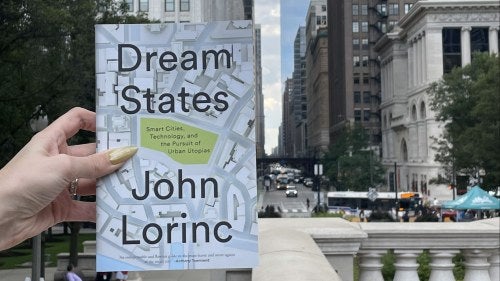John Lorinc Raises Tough Questions on Smart City Technology

With AI set to reshape the world, "Dream States" offers a timely and comprehensive analysis of the challenges and opportunities of smart city technology.
In August 2023, the Council announced the six-title shortlist for the inaugural 2023 Pattis Family Foundation Global Cities Book Award, which celebrates books that deepen our understanding of the role cities play in addressing critical global challenges. Over the coming weeks, we’ll be sharing interviews with the shortlisted authors discussing their books and the pressing issues facing cities today.
As urban leaders prepare for the disruptions that AI will bring, John Lorinc’s Dream States: Smart Cities, Technology, and the Pursuit of Urban Utopias raises tough and important questions about smart city tech and its impact on urban communities, surveillance, automation, and public transportation.
Lorinc is a journalist and editor who reports on urban affairs, politics, business, technology, and local history. He is the recipient of the 2019/2020 Atkinson Fellowship in Public Policy. Lorinc recently joined us for a conversation on the influences of his book. The author’s responses have been lightly edited.
Q: Cities are not just places but becoming actors in shaping local and international policy. What lessons do you hope other cities take away from your book?
A: Because technology is highly transferable, and also because digital technology is ubiquitous, the discussion about the uses and misuses of smart city tech have become universal. But there's a lot of experimentation going on, and there's much to be learned from what some cities did successfully, and other cities did not.
Q: What is the greatest challenge facing cities today and how do cities move forward?
A: As human society becomes ever more urbanized, and as the earth's atmosphere warms, it seems clear that climate change is a fundamentally urban problem, but the solutions will also emerge from cities, which have the economies of scale to enable carbon reduction and mitigation technologies to flourish. It is the challenge of 21st century urbanism.
Q: Which book(s) influenced you the most in crafting yours?
A: This is a difficult question because the list is long, but one book I go back to over and over again is Sir Peter Hall's Cities in Civilization.
Q: What area of study did you intend your book to contribute to, and why did you choose that topic to write on?
A: I have written for years about both cities and technology, and so the whole field of smart cities was highly appealing. Lots of stories, lots of conflict and innovation. I'm hoping that Dream States will be useful to people who are involved in city building in some way — planners, architects, engineers, etc., but also ordinary city-dwellers who are the end users of smart city technologies.
Q: What are you trying to achieve with your book?
A: We often have a kind of passive relationship with new technology, beyond adopting it to our lifestyles. Smart city tech raises all sorts of issues around the use of technology in the public realm, privacy, surveillance, climate mitigation and so on. Like earlier generations of urban technology, these devices and systems will alter cities and my hope for the book is to encourage people to ask questions about how they're used and deployed, and whether the results will be beneficial or problematic.





